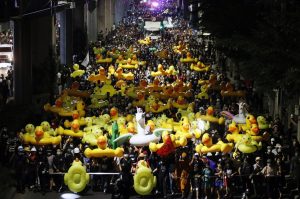A man in Thailand has been sentenced to two years in prison for selling calendars featuring inflatable yellow duck that were deemed to defame the monarchy.
26 year old Narathorn “Tonmai” Chotmankongsin was convicted on March 7, after a six-day trial in the Criminal Court in Bangkok’s Taling Chan district.
The court ruled that the depiction of the yellow duck was a mockery of Thailand’s King Vajiralongkorn. Tonmai was arrested in December 2020 after selling calendars featuring cartoons of yellow ducks via pro-democracy group Ratsadon’s Facebook page.
The use of yellow rubber duckies became an unofficial mascot for pro-democracy protesters gained attention when they were first used as shields against chemical-laced water cannons in late 2020 street protests. However, the court ruled that the images and descriptions in the calendar ridiculed and defamed His Majesty, and charged Tonmai with lese majeste, or royal insult.

Lese majeste is a law written to protect the Thai monarch and his immediate family from insult, but it has become broadly interpreted to apply to anything that might be construed as critical of the institution itself. Convictions are punishable by up to 15 years in prison per offense.
Tonmai’s sentence has been criticised by human rights groups, who argue that the case sends a message that Thailand is moving further away from becoming a rights-respecting democracy. The number of lese majeste cases in Thailand has significantly increased in recent years, with authorities charging over 200 people with lese majeste crimes since late 2020.
Thai authorities have also used the Computer Crime Act to prosecute people who have posted critical comments about the monarchy online and have charged some people with sedition under section 116 of the Penal Code.
The use of lese majeste laws to silence dissent has been a contentious issue in Thailand for many years. The laws date back to 1908, when Thailand was still known as Siam. They were introduced as a way of protecting the monarchy from criticism during a time of political upheaval. Over time, the laws have been used to silence political opponents and to prevent criticism of the monarchy. Critics argue that the laws are a violation of freedom of speech and have been used to suppress political dissent in the country.
The use of lese majeste laws has become increasingly controversial in recent years, as more and more people have been charged with offenses related to the laws. The laws have also been criticised by international human rights groups, who argue that they are a violation of freedom of expression.
Despite this criticism, the Thai government has continued to use the laws to silence political opponents and to prevent criticism of the monarchy.
According to Associated Press, the demands to reform the monarchy have been controversial because by tradition, the institution has been considered untouchable and one of the main foundations of Thai nationalism.










